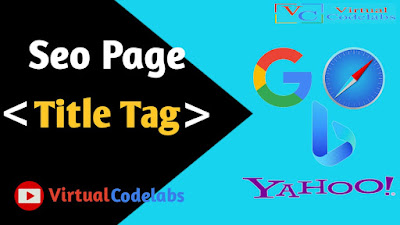Page Title Tag
The SEO page title tag, also known as the title tag or HTML title tag, is an important element of on-page SEO. It is the title displayed as the clickable headline in search engine results pages (SERPs) and serves as a concise description of the webpage's content. Optimizing the page title tag is crucial for improving search engine rankings and attracting users to click on your webpage. Here are some key considerations for optimizing the page title tag:
1. Relevant Keywords: Include relevant keywords that accurately represent the content of the webpage. Conduct keyword research to identify high-impact keywords related to your topic or focus. Place the most important keywords closer to the beginning of the title tag for better visibility and relevance.
2. Length: Keep the title tag within recommended limits. While there is no strict character limit, search engines typically display up to 60-70 characters or around 600 pixels. Longer titles may get truncated in search results, potentially affecting click-through rates. Aim for concise, descriptive titles that provide a clear idea of the webpage's content.
3. Unique and Descriptive: Craft unique and descriptive titles for each webpage. Avoid duplicating title tags across multiple pages, as this can confuse search engines and users. Each page should have a distinctive title that accurately reflects its content.
4. User-Friendly Language: Write title tags that are clear, compelling, and understandable to users. Avoid excessive use of technical jargon or overly complicated language. Focus on creating a title that entices users to click and explore the webpage further.
5. Branding: Consider incorporating your brand name or website name into the title tag, especially for important pages or homepage. This helps with brand recognition and establishes a consistent presence in search results.
6. Call to Action: Where appropriate, include a call to action (CTA) in the title tag to encourage users to click. CTAs like "Learn More," "Discover," or "Find Out" can attract attention and increase the likelihood of clicks.
7. Relevance and Accuracy: Ensure that the title tag accurately represents the content of the webpage. Misleading or irrelevant titles may lead to higher bounce rates and negatively impact user experience.
8. Avoid Keyword Stuffing: While it's important to include relevant keywords, avoid keyword stuffing, which is the excessive use of keywords in an unnatural way. Keyword stuffing can harm your SEO efforts and may result in search engine penalties.
9. Review and Test: Regularly review and assess the performance of your title tags. Monitor keyword rankings, click-through rates, and user behavior metrics to determine the effectiveness of your titles. Make adjustments as needed to optimize for better results.
Optimizing your page title tags is an important aspect of on-page SEO. By creating unique, relevant, and compelling titles that incorporate targeted keywords, you can improve the visibility of your web pages in search engine results and attract more clicks from users.



